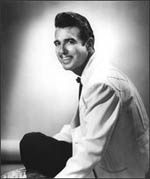Tennessee Ernie Ford was a beloved personality and performer during the '50s and '60s whose best known song was his version of Merle Travis' "Sixteen Tons." During his long career, Ford recorded over 100 albums and earned numerous honors and awards, including the distinguished Medal of Freedom. A native of Bristol, Tennessee, he began his career as deejay on a local radio station. In the late '30s, he left to study classical music and voice at the Cincinnati Conservatory of Music. After serving in World War II, he moved his family to San Bernardino, CA, to work on a local radio station. It is there that he first took on the name "Tennessee Ernie."
Ford later moved to a Pasadena station where his potential as a singer was recognized by Cliffie Stone, who hired Ford as a featured act on two of his radio shows. From there, he signed to Capitol Records in 1949. Five singles were released that year, including "Tennessee Border" and "Smokey Mountain Boogie" (both Top Ten) and his first number one single, "Mule Train." Early in 1951, "The Shot Gun Boogie" became his second number one, spending 14 weeks at the top of the country charts. By the beginning of 1953, Ford wasn't having as many hits, but he remained popular not only in America, but also in England; he became the first country singer to star at the London Palladium. He became a television quizmaster in 1954, hosting NBC's College of Musical Knowledge. He also had his own daily show and continued recording.
Ford had two Top Ten country hits in 1955 with "Ballad of Davy Crockett" and his biggest success, "Sixteen Tons," which spent ten weeks at number one on the country charts and eight weeks at number one on the pop charts. Between 1956 and 1961 he helmed his own primetime NBC show, which popularized the catch-phrase "Bless your little pea-pickin' hearts." As a recording artist, he had great success with his first gospel album, Hymns (1956), which became the first religious album to go gold. Ford's second gospel album Great Gospel Songs earned him a Grammy. In 1965, he had his last chart entry with the Top Ten single "Hicktown." Ford joined the ranks of the Country Music Hall of Fame in 1990, a year before he died of liver failure
